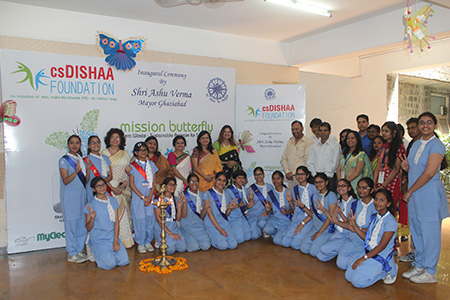The key functionaries of the scheme are the well connected Women’s Health Workers who already operate in the community; the use of dedicated Jumbo Bins (green for bio-degradable, ie. composting and blue coloured for recycling and disposal); garbage collectors; the provision of services for support and training; and various systems for waste management.
It requires the collection, segregation and management of waste; the use of composting and recycling facilities including privately maintained dry-storage facilities.
Income is generated from fee collection, fees for consultants and service providers, the sale of resultant compost and the recyclables such as plastic, metals and glass.
To encourage wider participation and the evolution of community spirit membership signs (Green Home logo) are provided to signal household and institutional support.
The Mission Butterfly integrated solid waste management (ISWM) program, to be managed by the local NGO as the executing agency for a two year transition period before adoption by the Nagar Nigam (Municipal Board – the urban local body responsible for waste management).
Key features are therefore:
- Community information and mobilisation;
- Segregation of domestic waste;
- Collection of waste.
- Sale of product.
SEGREGATED WASTE- COLLECTION AND TREATMENT
Transport: Segregated waste is collected from the doorstep by Mission Butterfly workers and transported to the designated Cluster Bins, depending on access by wheel barrows, rickshaws, manually and mules.
Waste is collected by pickups or the Refuse Collector cum Compactor and transported from the Cluster Bins to the designated site (eg. composting , the re-cycling plant or land fill,).
Suitable traffic cones and barriers are used on road sides during collection for safety.
Regular applications of deodorant (EM)to community bins, twin bin rickshaws, pickups, dumpers and at the compositing sites helps contain bacteria and minimises odours.
COMPOSTING PITS
Composting pits operate on 45 to 60 day cycles for the anaerobic composting of wet wastes and the resultant compost is sold to generate revenues.
RECYCLING PLANT
At the Recycling Plant the Dry Waste is further segregated by trained workers into different grades of plastics, tins, metals, glass, paper, mill board, card board, tetra packs, etc. After segregation, they are washed, dried, and sent to different end users.

